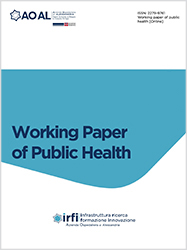SARS-COV-2 can induce an alteration of the autoimmune profile

All claims expressed in this article are solely those of the authors and do not necessarily represent those of their affiliated organizations, or those of the publisher, the editors and the reviewers. Any product that may be evaluated in this article or claim that may be made by its manufacturer is not guaranteed or endorsed by the publisher.
Objective: The study evaluated the autoimmune profile of COVID-19 positive hospitalised patients. Methods: 40 hospitalised patients with a confirmed diagnosis of COVID-19 were given clinical chemistry and autoimmunity tests. Results: The 40 patients enrolled in our hospital had elevated levels of common inflammatory markers such as C-Reactive Protein (CRP), Lactate Dehydrogenase (LDH) and ferritin. Interleukin-6 (IL-6) concentration was also increased, confirming the key role of this interleukin during severe acute respiratory syndrome (SARS-CoV-2) infection. The most common autoimmunity tests were performed. A significant prevalence of anti-nuclear antibodies (ANA), anti-neutrophil cytoplasmic antibodies (ANCA) and anti-Saccaromyces cerevisiae (ASCA IgA and IgG) was found. Patients showing a de novo autoantibody response were those with a worse disease prognosis. Conclusion: Our study shows that COVID-19 infection can trigger an autoimmune response and could induce the onset of autoimmune diseases. These data explain why drugs used to treat autoimmune diseases could also be useful in combating SARS-CoV-2 infection.
PAGEPress has chosen to apply the Creative Commons Attribution NonCommercial 4.0 International License (CC BY-NC 4.0) to all manuscripts to be published.

 https://doi.org/10.4081/wpph.2020.9246
https://doi.org/10.4081/wpph.2020.9246




